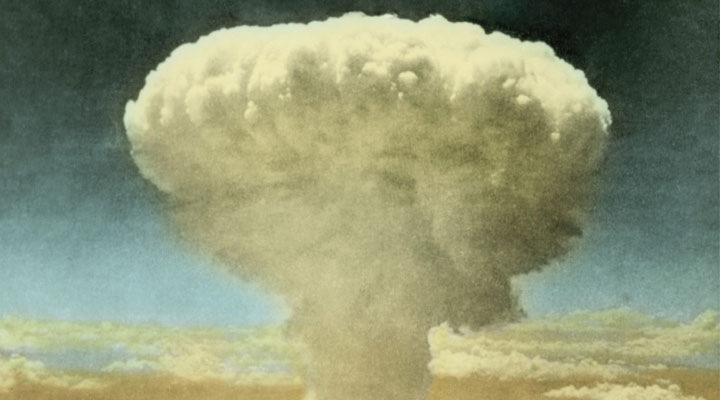But in April nineteen forty-five, the scientists told the new president, Harry Truman, that they were almost ready to test their invention. Just three months later, they exploded the world's first atomic bomb in the desert in the southwestern state of New Mexico. Truman had to make a difficult decision. He knew the atomic bomb would cause widespread death and suffering if it was used on a Japanese city. But he was willing to do anything to avoid the need for American troops to invade Japan. In Japan, a new prime minister and government were searching for a way to end the war. But Truman believed that the Japanese were still not ready to surrender. And he felt it was his duty to end the war as soon as possible.
On August sixth, nineteen forty-five, the first atomic bomb fell on the city of Hiroshima. Three days later, a second A-bomb fell on the city of Nagasaki. "Having found the atomic bomb, we have used it. We shall continue to use it until we completely destroy Japan's power to make war. Only a Japanese surrender will stop us." President Truman. "It is an awful responsibility which has come to us. We thank God that it has come to us, instead of to our enemy." The Radiation Effects Research Foundation in Japan estimates that between one hundred fifty thousand and two hundred forty-six thousand people died within two to four months of the bombings. The bombings left Japan's rulers with no choice. In less than one week, they surrendered. "I received this afternoon a message from the Japanese government. I deem this reply a full acceptance of the Potsdam Declaration, which specifies the unconditional surrender of Japan. In the reply there is no qualification. Arrangements are now being made for the formal signing of the surrender terms at the earliest possible moment. General Douglas MacArthur has been appointed the supreme allied commander to receive the Japanese surrender."
In this newsreel, we hear General MacArthur accepting the surrender of the Japanese Empire. "The battleship Missouri, fifty-three thousand ton flagship of Admiral Halsey's Third Fleet, becomes the scene of an unforgettable ceremony marking the complete and formal surrender of Japan. General of the Army Douglas MacArthur, supreme allied commander for the occupation of Japan, boards the Missouri. Fleet Admiral Nimitz, Pacific fleet commander, and Admiral Halsey welcome MacArthur and his Chief of Staff General Sutherland aboard. "It is Sunday, September second, nineteen forty-five." "We are gathered here, representatives of the major warring powers, to conclude a solemn agreement whereby peace may be restored. The issues involving divergent ideals and ideologies have been determined on the battlefields of the world and hence are not for our discussion or debate. "The terms and conditions upon which surrender of the Japanese Imperial Forces is here to be given and accepted are contained in the instrument of surrender now before you. I now invite the representatives of the emperor of Japan and the Japanese government and the Japanese Imperial Headquarters to sign the instrument of surrender at the places indicated."

American scientists and engineers proved that a war could be won with research as well as bullets. And all Americans learned how much could be gained when government agencies, scientists and universities worked together for common goals. Roosevelt had understood this long before the war ended. He asked Vannevar Bush to study how the federal government could work with scientists and universities in peacetime. Bush offered a number of ideas to President Truman at the end of the war. He told the president that science was important to America's progress and safety. He called on the federal government to support scientific study and education. Professor Bush said that the nation's universities should be greatly strengthened. He called for the creation of a new government agency to provide money for science projects.
Truman and Congress agreed with Vannevar Bush. And in the next few years, American research efforts expanded. In nineteen forty-six, the Office of Naval Research was created to support basic science study in universities. In the same year, the government created the Atomic Energy Commission. And in nineteen fifty, it created the National Science Foundation to provide support to thousands of the nation's best scientists. In the years that followed, American science would grow beyond the wildest dreams of Vannevar Bush and other scientists of his time. Universities would add thousands of new students along with new laboratories and research centers. By the middle of the nineteen sixties, the federal government would spend more than thirteen billion a year for research and development. And five hundred new centers of higher learning would be created. All this investment would help make the United States the world leader in such fields as computer science, genetics and space travel.












